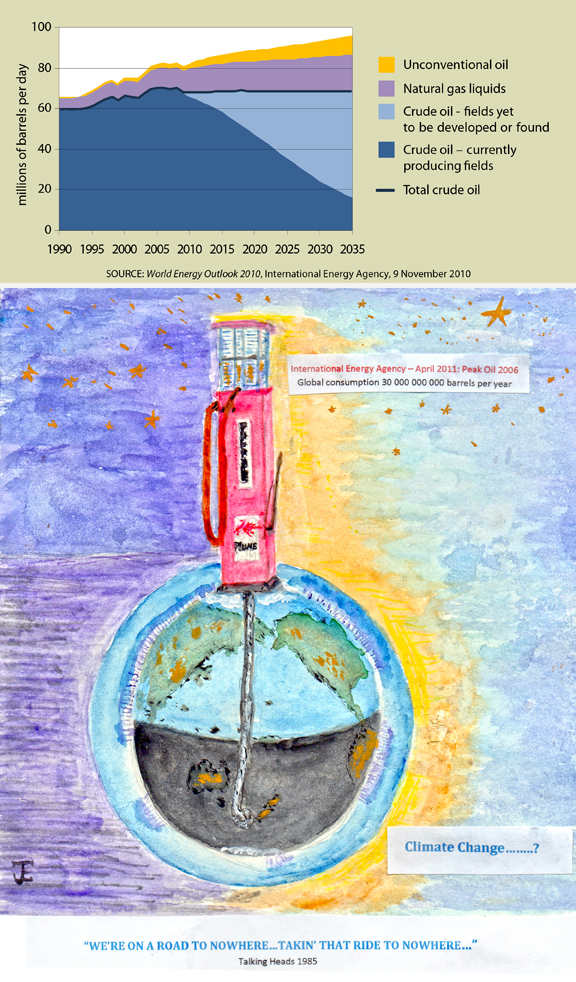The world’s oil establishment has at last acknowledged the reality of peak oil. Now we have to work out what to do about it, and it won’t be easy. [24 May 2011 | Peter Boyer]
How are we travelling? Well, not far ahead — perhaps within a couple of years — and in the absence of one or two small miracles, most of us are going to start thinking about whether we really need to make that trip.

(Top) IT’S OFFICIAL: This IEA graph shows steeply declining production from current oilfields and a future heavily dependent on natural gas, unconventional oil and “fields yet to be developed or found”. (Bottom) A WORLD HALF EMPTY: John Evans’s take on peak oil
The cause of this new mindset will be the high cost of fuel, driven by the fact that world oil production is past its peak and is now on a terminal, irreversible downward slope.
I don’t blame you for thinking this is just another doomsday prediction from the loony alarmist fringe. After all, we’ve heard not a peep about peak oil from any Australian leader, state or federal.
But don’t take my word for it. Read what Dr Fatih Birol, the International Energy Agency’s chief economist, has to say. Honoured with awards from the US, half a dozen European countries and the International Association of Energy Economics, this man has the ear of people in high places.
Interviewed in his Paris headquarters recently for the ABC’s Catalyst program, Birol declared bluntly that “the age of cheap oil is over”, advising everyone to get ready for higher prices and “change our mobility habits”.
“Existing fields are declining so sharply that in order to stay where we are in terms of production levels in the next 25 years we have to find and develop four new Saudi Arabias,” said Birol. “It would be too optimistic to say that any government is ready to face this challenge.”
And then the clincher: “We think that crude oil production has already peaked in 2006.” At long last, following an oblique reference to peak oil in a report last November, the IEA has publicly acknowledged that it’s a real problem — and that it happened years ago.
For decades an unholy alliance of governments and oil corporations routinely ignored independent analysts’ claims that impending peak oil demanded attention, preferring the illusion that all was well. The IEA’s change of tack is a recognition that such fudging is no longer working.
Others have noticed the emperor’s sudden loss of clothes. In its “World Economic Outlook” report released last month, the International Monetary Fund declared that “global oil markets have entered a period of increased scarcity” and that “a return to abundance is unlikely in the near term”.
According to the IMF, adverse effects could include sudden oil price surges triggering major global economic disruption. It advised governments to develop policies to deal with oil scarcity.
Hallelujah. At last the world of mainstream economics has acknowledged what’s been staring it in the face for years — that oil scarcity is a genuine threat to our future well-being.
We’re deep in a mire of our own making, exacerbated by governments, the oil industry and the rest of us pretending that everything was under control. But the transport threat highlighted by Birol in his Catalyst interview isn’t even half the story.
Mineral oil is small miracle — a uniquely powerful energy source. In the past (but no longer) we’ve been able to get it out of the ground using a small fraction of the energy that it yields when burned. It enables us to jet away to the ends of the earth, or drive our cars when and where we like.
As a transport fuel it’s a cost factor in virtually everything we buy and do, but it’s much more than that. It touches every part of our lives. It’s an essential ingredient in plastic in its countless forms, as well as chemicals such as medicines, pesticides, and, most important of all, soil fertilisers.
Oil gave us what we came to know as the green revolution. Oil-based fertilisers have enormously increased the productivity of soils around the world, such that the food crisis we thought was around the corner in the 1970s turned into a glut. Crisis? What crisis?
We might somehow manage without the energy we get from oil, but we can’t survive without food, and we’ve all but forgotten how to produce it in quantity without oil. Add to that the need to transport food and it becomes clear that oil scarcity means pretty much the same for food.
In the post peak oil era there’ll be no soft landing for Tasmania. A shortfall in the two tonnes of fuel we import per person per year to keep us going will be felt by everyone, directly and immediately. Any official plan — and we’ve yet to see one — must address some big questions.
For instance, we’ve heard a lot about electric-powered vehicles as “solutions”, but not a lot about the cost of generating and transmitting enough electricity to recharge these vehicles when they hit the road in numbers.
Similarly, we’ve so far failed to get our heads around how we might produce enough biofuel to keep our internal combustion engines running. How might land-based biofuel production be limited by our absolute need to eat? Might we find salvation in ocean-farmed marine algae?
More broadly, if alternative mineral fuel sources such as shale gas deposits, coal seams or oil sands buy the world time to adjust and adapt without losing the plot, what will be the cost in carbon emissions and environmental damage?
Our future is here, folks. Welcome.
